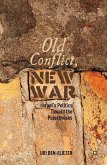The book provides a comprehensive sociological and cultural explanation of Israel's politics toward the Palestinians, covering the period of the Oslo Accords and the Second Intifada and focusing on the concept of a 'new war' that is an outgrowth of internal relations within Israel itself and the diversionary politics of its leadership.
"Ben-Eliezer (sociology, Univ. of Haifa, Israel) adds to an understanding of the transition of Israel from a society and polity led by secular, socialist, and tolerant nationalists of European descent to a nation inexorably dominated by Israelis from the wider diaspora who embrace aggressive ethnonationalism that demonizes and isolates Palestinians as enemy Arabs . . . Recommended." - CHOICE
"Uri Ben-Eliezer has written a head-turning account of a major shift in Israel's military policy. He offers a fascinating account of how a changing global culture after the Cold War gave rise to a new kind of nationalism in Israel - with its own brand of military solutions for dealing with the Palestinian issue. This book is a must-read for anyone interested in Israel, the Middle East, or the new ways that wars are conceived of and fought in the twenty-first century." - Joel S. Migdal, Robert F. Philip Professor of International Studies, University of Washington and author of Permanent Player: The United States and Middle East Regional Dynamics
"In this eye-opening and hard-hitting analysis, Uri Ben-Eliezer demonstrates how rising settler militancy and militarism within Israel trounced the earnest but feeble civil society drive behind the Oslo Accord and rendered the Second Intifada all but inevitable. More broadly, his study highlights the symbolic aspects and diversionary uses of war and rethinks the nature of contemporary asymmetrical warfare." - Gershon Shafir,co-editor of Struggle and Survival in Palestine/Israel
"Uri Ben-Eliezer has written a head-turning account of a major shift in Israel's military policy. He offers a fascinating account of how a changing global culture after the Cold War gave rise to a new kind of nationalism in Israel - with its own brand of military solutions for dealing with the Palestinian issue. This book is a must-read for anyone interested in Israel, the Middle East, or the new ways that wars are conceived of and fought in the twenty-first century." - Joel S. Migdal, Robert F. Philip Professor of International Studies, University of Washington and author of Permanent Player: The United States and Middle East Regional Dynamics
"In this eye-opening and hard-hitting analysis, Uri Ben-Eliezer demonstrates how rising settler militancy and militarism within Israel trounced the earnest but feeble civil society drive behind the Oslo Accord and rendered the Second Intifada all but inevitable. More broadly, his study highlights the symbolic aspects and diversionary uses of war and rethinks the nature of contemporary asymmetrical warfare." - Gershon Shafir,co-editor of Struggle and Survival in Palestine/Israel









